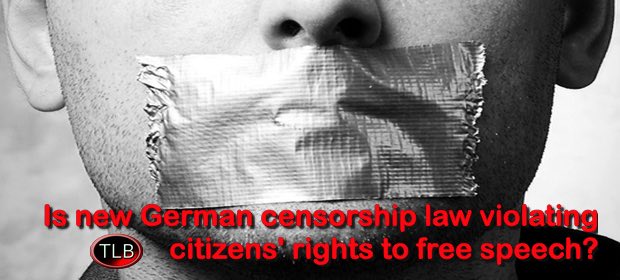
Germany: Return of the Stasi Police State?
- Germany’s new law requires social media platforms, such as Facebook, Twitter and YouTube, to censor their users on behalf of the government. Social media companies are obliged to delete or block any online “criminal offenses” within 24 hours of receipt of a user complaint — regardless of whether the content is accurate or not.
- Social media platforms now have the power to shape the form of current political and cultural discourse by deciding who will speak and what they will say.
- Notice the ease with which the police chief mentioned that he had filed charges to silence a leading political opponent of the government. That is what authorities do in police states: Through censorship and criminal charges, they silence outspoken critics and political opponents of government policies, such as Beatrix von Storch, who has sharply criticized Chancellor Angela Merkel’s migration policies.
- While such policies would doubtless have earned the German authorities many points with the old Stasi regime of East Germany, they more than likely contravene the European Convention of Human Rights (ECHR) to which Germany is a party, as well as the case law of the European Court of Human Rights.
Germany’s new censorship law, which has introduced state censorship on social media platforms, came into effect on October 1, 2017. The new law requires social media platforms, such as Facebook, Twitter and YouTube, to censor their users on behalf of the German state. Social media companies are obliged to delete or block any online “criminal offenses” such as libel, slander, defamation or incitement within 24 hours of receipt of a user complaint — regardless of whether the content is accurate or not. Social media companies are permitted seven days for more complicated cases. If they fail to do so, the German government can fine them up to 50 million euros for failing to comply with the law.
The new censorship law, however, was not fully enforced until January 1, 2018, in order to give the social media platforms time to prepare for their new role as the privatized thought police of the German state. Social media platforms now have the power to shape the form of current political and cultural discourse by deciding who will speak and what they will say.
On January 1, 2018, however, the law was immediately enforced. Twitter began by suspending the account of the deputy leader of the Alternative for Germany party (AfD), Beatrix von Storch, for 12 hours, after she tweeted the following in response to a New Year’s greeting issued in Arabic by the Cologne Police:
“What the hell is happening in this country? Why is an official police site tweeting in Arabic? Do you think it is to appease the barbaric, gang-raping hordes of Muslim men?”
(During New Year’s Eve of 2015/16, over 1,000 mainly Muslim men sexually assaulted around 1,200 women in Cologne.)
Von Storch also had her Facebook account suspended for repeating her tweet there. Facebook told her that her post contravened German law as it constituted “incitement to hatred”.
It did not stop there. Cologne police filed charges against von Storch for “incitement to hatred”, which is punishable under section 130 of the German Criminal Code. According to the Cologne police chief, Uwe Jacob, multilingual tweets at major events are an important part of the police’s communication strategy:
“The campaign was really well received by most people – however, some were bothered by the fact that we tweeted in Arabic and Farsi – they were very prominent right-wingers, who then felt that they had to make tweets that incited to hatred. We simply filed charges”.
Notice the ease with which the police chief mentioned that he had filed charges to silence a leading political opponent of the government. That is what authorities do in police states: Through censorship and criminal charges, they silence outspoken critics and political opponents of government policies, such as von Storch, who has sharply criticized Chancellor Angela Merkel’s migration policies.
While such policies would doubtless have earned the German authorities many points with the old Stasi regime of East Germany, they more than likely contravene the European Convention of Human Rights (ECHR) to which Germany is a party, as well as the case law of the European Court of Human Rights. Article 10 of the European Convention of Human Rights states:
1. Everyone has the right to freedom of expression. This right shall include freedom to hold opinions and to receive and impart information and ideas without interference by public authority and regardless of frontiers…
2. The exercise of these freedoms… may be subject to such… restrictions or penalties as are prescribed by law and are necessary in a democratic society, in the interests of national security, territorial integrity or public safety, for the prevention of disorder or crime, for the protection of health or morals, for the protection of the reputation or rights of others, for preventing the disclosure of information received in confidence, or for maintaining the authority and impartiality of the judiciary.
In its case law, the European Court of Human Rights has stated that Article 10
“…protects not only the information or ideas that are regarded as inoffensive but also those that offend, shock or disturb; such are the demands of that pluralism, tolerance and broad-mindedness without which there is no democratic society. Opinions expressed in strong or exaggerated language are also protected”.
Even more important in the context of charges against politicians is the fact that according to the European Court of Human Rights’ case law:
“…the extent of protection depends on the context and the aim of the criticism. In matters of public controversy or public interest, during political debate, in electoral campaigns… strong words and harsh criticism may be expected and will be tolerated to a greater degree by the Court”.
CONTINUE READING HERE
ER recommends other articles by The Gatestone Institute
About the author
Judith Bergman is a columnist, lawyer and political analyst




